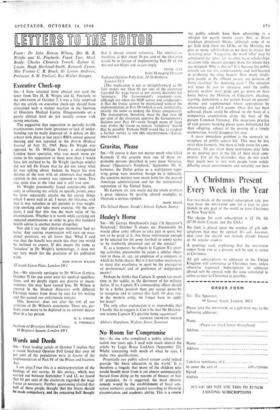Executive Check-up
n
L
_J -/
C
From : Dr John Rowan Wilson, Drs H. B. Wright and G. Pincherle, Frank Teer, Mark Brady, Charles Chenevix Trench, Robert G. Logan, Hugh Heckstall-Smith, Kenneth Tynan, Mrs Yvonne C. R. Brock, Sir Linton Andrews, Professor A. H. Verkuyl, Rev Walter Hooper.
SIR,—I have returned from abroad and read the letter from Drs H. B. Wright and G. Pincherle in the SPECTATOR of October 7. I was a little surprised that my article on executive check-ups should have stimulated such a violent reaction in the Institute of Directors Medical Centre. Disagreements on a purely clinical level do not usually arouse such strong emotions.
The suggestion that opposition to periodic health examinations stems from ignorance or lack of under- standing can be easily disposed of. A debate on this subject took place at last year's BMA annual general meeting and was reported in the British Medical Journal of July 31, 1965. Here Dr Wright was opposed by Dr William Evans, a distinguished London heart specialist, who was much more ex- treme in his opposition to these tests than I would have felt inclined to be. Dr Wright (perhaps wisely) did not tell Dr Evans that he did not know what he was talking about_ Indeed, he began his own defence of the tests with an admission that medical opinion in this country was opposed to them. This was quite true at the time and is still true now.
Dr Wright presumably found considerable diffi- culty in criticising my article on specific points, since his letter repeatedly attacks me for saying things which I never said at all. I never, for instance, said that it was valueless to tell patients to lose weight, stop smoking and take more exercise. On the con- trary, I said that this was the main value of the examinations. Whether it is worth while carrying out repeated examinations in order to give this standard health advice is another matter altogether.
Nor did I say that check-ups themselves had no value. Any routine examination will turn up occa- sional positives; we all know that. What I said was that the benefit was much less than one would be inclined to expect. If this means the same as `valueless' in Dr Wright's terminology, it does not say very much for the precision of his published work.
JOHN ROWAN WILSON
32 South Eaton Place, London SWI






































 Previous page
Previous page